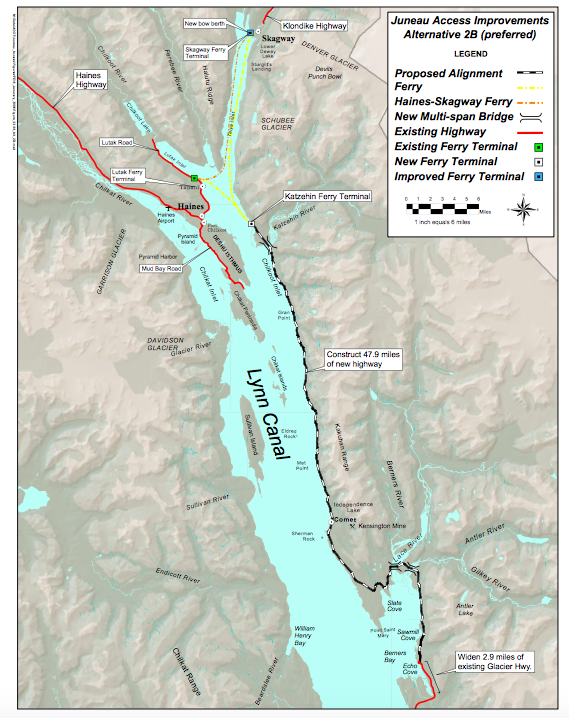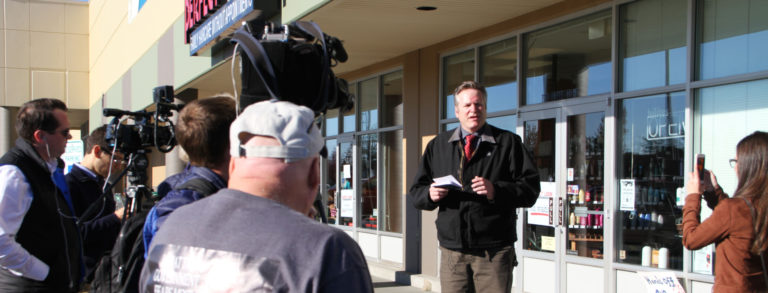THIS PROJECT IS SHOVEL READY
The construction of the Lynn Canal Highway, connecting Juneau, Haines, and Skagway, first proposed over 50 years ago, is back in the news. Apparently, Governor Bill Walker is considering moving ahead on the most recent version of this project (labeled Alternative 2B). This should be good news to Alaskans who want to see more affordable and convenient transportation options available in our region.
The perceived imminence of the Governor’s decision has prompted a flurry of activity from project opponents who claim the State cannot afford to build a 50-mile road coupled with a six-mile shuttle ferry ride connecting Juneau with the rest of Alaska and the continental road system. Nothing could be further from the truth.
Fact: The $574 million cost of this project will not reduce our Permanent Fund Dividend. Nor will it reduce spending on needed public safety concerns and social services. 90% of the project cost is paid for by the Federal government with highway transportation dollars. The state match was appropriated years ago.
Opponents also worry we won’t have funds available for other transportation projects around the State – causing them to be delayed or cancelled.
Fact: There are no other shovel-ready projects of significant size on the horizon that can utilize Federal matching funds. Alaska has not built any new highways in decades and it becomes more difficult each year just to find qualifying projects. Over the project construction life, only 12-15% of federal highway dollars would be needed each year – leaving sufficient funding for maintenance and upgrade projects that qualify.
The two primary points detractors seem obsessed with are (1) the project’s “poor economic return” and (2) their contention that annual maintenance and operating costs are too high. Both of these arguments reflect a basic misunderstanding of numbers in the Environmental Impact Study (EIS).
Regarding project economic return, everyone realizes transportation infrastructure is a core function of government and that roads are rarely designed to “make a profit.” So the fact this road project does not shouldn’t surprise anyone.
The EIS reflects the Cost Benefit Ratio of the Lynn Canal Highway project is .28 – which opponents claim means “the state would get 28 cents worth of value for every dollar it spends.” Yet this ratio only measures the actual dollar savings to users – $118 million – certainly nothing to sneeze at but only a fraction of the benefits of the project. If measured against the actual State investment, that ratio would show a return of over 200%.
Fact: User benefits (savings in travel costs), while substantial, do not take into account resulting lower transportation costs and increased economic activity in the region that will generate new business opportunities and tax revenue at the state and municipal level. Furthermore, it ignores the 75% reduction in the state subsidy for every vehicle using the current ferry system in Lynn Canal.
But the greatest distortion opponents perpetuate is that annual operating costs of preferred Alternative 2B greatly exceed annual operating costs of the “No Action Alternative”– by almost $5 million annually.
If opponents had actually read the EIS, they would know this isn’t true. The $5 million difference between operating costs only refers to expenses and does not account for revenues of each alternative. When revenues are factored in the net difference is only $2.3 million annually – cutting more than half the cost.
Furthermore, this number doesn’t include all the additional fuel taxes that will be generated based on a ten-fold increase in vehicle traffic transiting northern Lynn Canal. The taxes gained from vehicles traveling north beyond Haines and Skagway as well as from the incremental traffic originating from northern cities coming to Juneau could be considerable.
Again, as with the cost-benefit ratio, critics ignore additional revenues derived from increased economic activity as well as the 530 jobs and hundreds of millions of dollars in payroll created during construction – an economic infusion Alaska desperately needs to help offset our bleak budget picture due to declining oil revenues.
No legitimate fiscal argument exists against this road project. When weighed against the alternative of a ferry-only operation in Lynn Canal, the choice is clear.
At nearly the same annual net cost of taking no action at all, building this road will increase capacity and convenience exponentially while lowering transportation costs throughout the region.
Just as important, this will strengthen our existing ferry system – allowing mainliners to serve other ports more frequently – while lowering overall costs. Alternatively, according to Alaska Department of Transportation, by not replacing one mainline ferry in Lynn Canal the State would save $1.7 billion in costs over a 50-year period.
Isn’t that the definition of fiscally responsible?
Win Gruening was senior vice president in charge of business banking for Key Bank, retiring in 2012. Born and raised in Juneau, he is a longtime Rotarian and remains active in civic issues.
















